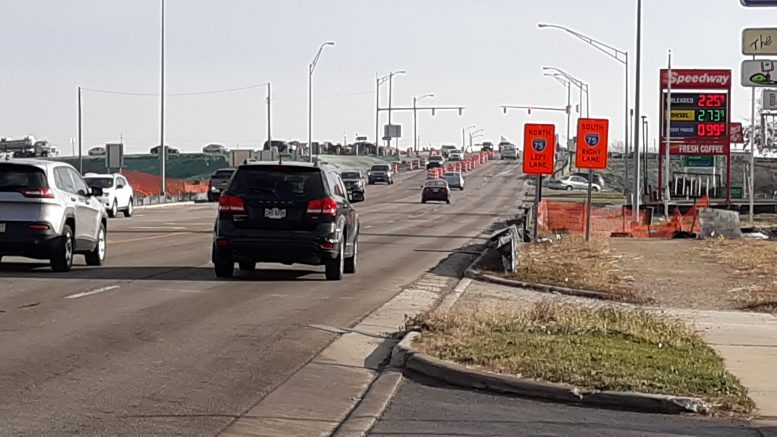A majority of Ohioans support a bipartisan infrastructure package being considered in Washington, D.C., according to a new poll commissioned and touted by a state environmental group.
Around half of the 800 Ohioans polled offered support for the infrastructure bill, with approval rising to 64% after hearing some of the specific proposals in it, such as public transit spending and broadband internet expansion.
The poll found broad support for seven different infrastructure bill components, with most Democrats and most Republicans giving each the thumb’s up. So too did most respondents in a dozen primarily Appalachian counties that were targeted for living in coal and natural gas development areas.
The Nature Conservancy in Ohio, which commissioned a Republican polling firm to conduct the survey, sees the results as evidence that voters from both political parties support efforts to invest in a variety of Ohio infrastructure priorities.
President Joe Biden proposed a sweeping, $2 trillion infrastructure package earlier this year that pitched investments in traditional road and bridge projects along with broader needssuch as clean drinking water, affordable housing and child care.
The Biden administration and members of Congress have spent the past few months negotiating a bipartisan deal, but disagreements remain on what all spending priorities should be included and how to pay for them. This is shaping up to be an important week of talks, with GOP Sen. Rob Portman having said on Sunday the negotiators are “about 90% of the way there.”
“It’s been so rapid fire,” Akshai Singh, an Ohio transit activist, said about the back-and-forth of the infrastructure deal-making.
Singh represents a number of transportation organizations, including MOVE Ohio and the National Campaign for Transit Justice. The latter group released its own report this week detailing how proposed funding increases to public transportation would impact transit systems in Ohio, from Youngstown to Dayton.
A majority of public transit riders are people of color, the report notes, and most riders in places like Cleveland and Cincinnati are Black residents. Advocates have long promoted public transit spending as a means of improving economic opportunities, providing racial equity and shifting away from an overreliance on cars.
Those in Ohio repeatedly point to a 2015 study from the state department of transportation that outlined the investments needed to maintain and upgrade transit systems in Ohio cities.
The state lacks a steady funding stream for transit needs, however, with advocates having to push for continued spending every two-year budget cycle. (Gov. Mike DeWine initially proposed cutting state funding for public transportation almost entirely before lawmakers restored the funding.)
It’s argued that federal spending could help cities and states make necessary improvements to keep the transit systems running for decades to come. But there were already federal investments made in 2020 to help those systems stay running during the pandemic, and Republicans in the U.S. Senate are reportedly weary about approving even more.
The report from the National Campaign for Transit Justice tries to make that case. The increased federal spending would allow the transit systems in eight major Ohio cities add new routes and increase service for the routes already offered.
In short, more people would have access to public transportation — and more often.
This is something Democrats and Republicans in Ohio both want, according to the Nature Conservancy poll. Overall, 77% support investments in public transportation along with two-thirds of Republican voters.
Singh and others want to see the infrastructure package allocate $20 billion annually for public transit needs, which Singh said would be a “massive game changer.”
“I still think there’s a lot of optimism that we can win some real investments in equity and climate issues,” Singh said.
***
Also from Ohio Capital Journal:
DeWine reaffirms support for aides, despite their roles in scandal-tainted legislation
One staffer waited weeks — and until after an FBI raid — to inform Gov. Mike DeWine that FirstEnergy had paid Sam Randazzo a massive sum just weeks before DeWine nominated Randazzo to be Ohio’s top utility regulator.
Another staffer, while still a FirstEnergy lobbyist, founded a dark-money group that would funnel tens of millions of utility dollars into an effort to pass a $1.3 billion package that benefitted FirstEnergy, a successor company and other Ohio utilities. The staffer then became DeWine’s legislative affairs director and worked to pass the bailout bill his boss would sign — and that federal prosecutors would later say was “likely the largest bribery and money-laundering scheme ever in the state of Ohio.”
But despite the growing scandal, DeWine’s spokesman on Tuesday said both staffers continue to enjoy the governor’s support.
“Absolutely,” said Press Secretary Dan Tierney, explaining that it’s important to remember that much less was known when news of the scandal broke last summer. “It’s always difficult for anybody to keep track of what was known then versus what’s being alleged now.” READ MORE
Commentary: We need cash bail reform to help fix the broken justice system
“Pay no attention to the man behind the curtain.”
I remember the first time I watched the Wizard of Oz. I was fascinated by the storytelling, mesmerized by the bright colors and exciting action, and terrified of “The Great and Powerful Oz.” That is until Toto, Dorothy’s adorable and fearless dog pulls back the curtain to reveal that there was no great or powerful Oz. There was just an old man using a ruckus to create fear to hold onto power.
Criminal justice reforms, like those in the Ohio legislature, both move us past a shadow of justice to actual justice and start the work of rebuilding trust in a broken and failing criminal justice system. House Bill 315 and Senate Bill 182 make the decisions about whether someone who is arrested is allowed to be at home until trial or must remain in jail based on their level of threat to the community, and/or their flight risk. As someone who has worked to bail people out who were being held for protesting for justice, to having an angry outburst to someone trying to take advantage of them, I can tell you that these bills are absolutely necessary to make our system more just and to make our communities truly safer.
Earlier this year I received a call from an activist in the state named Taylor Pennington. Taylor told me the story of a young woman who was in jail in another city in the state, and because there was not a local bail fund, she was hoping that the Cincinnati Bail Fund would be able to help. Taylor’s friend was charged with assault due to an altercation with an ex-boyfriend who had been harassing her for months. By the time Taylor was able to contact me, her friend had been sitting in jail for over 60 days. Her bail was set at $100,000. We could not pay 10% to get her released. While options to pay her bail were being pursued, family and friends were caring for her kids and pooling money together to pay her rent so that she would not be homeless if she were to be released on bond. READ MORE
Lawmakers propose $1,000 bonuses to Ohio National Guard members
A pair of state lawmakers want to give a financial bonus to all members of the Ohio National Guard as thanks for their service throughout the COVID-19 pandemic.
Each member deserves $1,000 as a “small way to show our appreciation for their valiant efforts,” state Reps. Richard Brown of Canal Winchester and Bride Rose Sweeney of Cleveland wrote to fellow lawmakers.
The Democrats noted the Ohio National Guard’s work to distribute food at food banks and in helping distribute vaccines at various clinics. Guard members were sent to assist Ohio prisons during the initial outbreaks in 2020.
Brown and Sweeney also highlighted the Guard deployment to Washington, D.C. in the wake of the Jan. 6 insurrection. READ MORE





